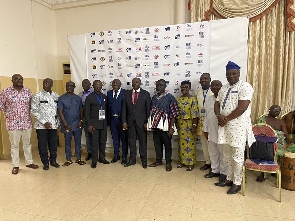The Ghana Institute of Freight Forwarders (GIFF) has held its 25th Annual General Meeting in the Eastern Regional Capital town of Koforidua to deliberate on how freight forwarders can maintain their relevance in a turbulent global supply chain.
Speaking at the event, the Omanhene of New Juaben, Daasebre Nana Kwaku Boateng III appealed to freight forwarders to be honest in their dealings with importers and refrain from acts of distortion. The President of GIFF, Eddy Akrong said in maintaining the freight forwarders’ relevance, efforts should not be spared from venturing into ICT solutions whose dividend would endear freight forwarders’ to the trader.
He appealed to the Minister of Transport to bring to finality some unjustifiable shipping line charges. Eddy Akrong said the GIFF research hub which was recently launched would make available research data to tackle challenges and also provide solutions to issues within the port and shipping industry. The Chief Executive Officer of the Ghana Shippers’ Authority, Benonita Bismarck, revealed that the Authority in collaboration with the Committee of Freight Forwarder Associations (COFFA) and the Ghana Union of Traders Association have engaged the shipping lines in order to streamline processes and address the general service quality issues within the cargo clearance space with the view to stemming the tide of arbitrariness in the introduction and increases in tariff.
She further disclosed that the 2021 estimates of the amount of demurrage paid by shippers in Ghana showed a significant decline to $19million and that the Authority will continue to pursue a further reduction to the barest minimum in the interest of shippers, especially with the recent increases in the daily demurrage rates by some shipping lines coupled with the current exchange rate volatility. The Eastern Regional Minister, Hon. Seth Kwame Acheampong commended freight forwarders for their immense role in the global supply chain.
“The various roles and activities carried out by the freight forwarder makes him indispensable in the current global supply chain. From Customs Brokerage to compliance, networking, scheduling, inventory management, warehousing, administration and documentation, the freight forwarder clearly maintains his relevance in the current turbulent global supply chain,” he noted.
The Minister of Transport, Kwaku Ofori Asiamah averred that to ensure a competitive business environment, there is the need to harmonize and standardize shipping line charges, negotiate for minimum service standards and more importantly, build strong regulatory framework for enforcement and compliance. This, according to him, will ensure non-proliferation of charges at the Ports, arbitrary increases of charges, improved service quality and value for money.
Leveraging on technology and building capacity and partnerships across the global supply value chain, he said could provide a competitive advantage in the service provision.
“I therefore want to take this opportunity to urge the Institute to provide the needed support and capacity building to ensure that members are abreast with modern trends in the industry,” he stated. Kwaku Ofori Asiamah revealed that the Ghana Shippers Authority Act has some inefficiencies, which precluded them from exercising their Authority, therefore, the act would be amended to give them more power.
He noted that sustainable shipping is the future of the industry, hence, the need to ensure that the maritime industry evolves along that trajectory.
“Ensuring environmental friendly ports, promoting regulations for green shipping through technology and renewable energy along the shipping value chain are some of the interventions being pursued by Government. Therefore, ensuring green logistics operations across the logistics value chain is a strategy that we must all pursue in our various capacities,” he stated.
Business News of Sunday, 27 November 2022
Source: Ghana Institute of Freight Forwarders













